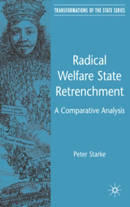|
 This study confronts one of the most fiercely contested issues in current political debates: how is the retrenchment of the welfare state possible when popular support for it remains strong throughout the OECD world?
This study confronts one of the most fiercely contested issues in current political debates: how is the retrenchment of the welfare state possible when popular support for it remains strong throughout the OECD world?
Traditionally, challenges to the welfare state were seen as electoral suicide, but this changed in the 1980s when Margaret Thatcher’s government began a series of cutbacks in the UK. During the 1990s, the New Zealand government announced the most radical social benefit cutbacks the country had ever seen. Examining these cases in detail, and contrasting them with Sweden and Germany, the autor argues that radical retrenchment is not the result of historical accident or political will but that it is due to a particular constellation of partisan and institutional factors.
Download
Flyer and and order form 
Table of Contents 
|
Starke, Peter
2007
Basingstoke: Palgrave
9-780-23000810-6
£ 50.00
More information
from the publisher 
|